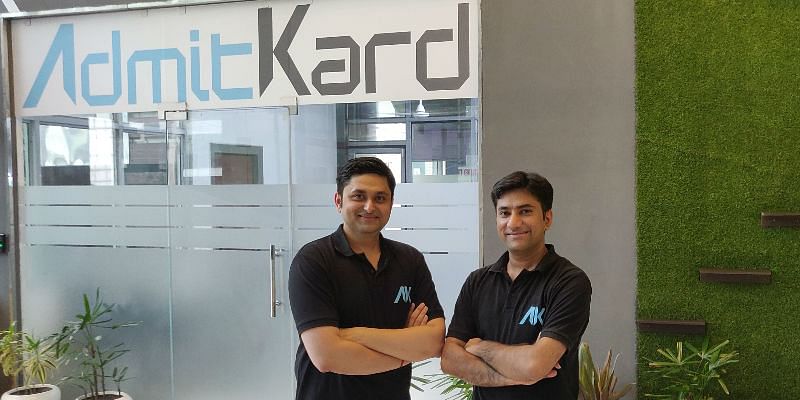Despite the pandemic interruption, ‘study abroad’ remains a mission for many young Indians. Industry estimates suggest that over a million Indian students seek cross-border admissions annually, collectively paying several billions of dollars in college fees and allied services such as visa, accommodation, loans, etc.
In 2019, 7.53 lakh students from India were studying abroad, according to data from the Ministry of External Affairs. India is the world’s second-largest market (behind China) in student outbound flow, and is slated to reach the top in a few years.
Several homegrown startups are now disrupting this largely unorganised space using technology. While some service individual segments like study abroad loans, counselling and mentoring, others have become full-stack platforms offering students end-to-end admission guidance.
AdmitKard falls in the latter category.
AdmitKard team based out of Noida
The Noida-based startup — founded in 2016 by IIM alumni and serial entrepreneurs Piyush Bhartiya and Rachit Agrawal — has built a tech-enabled ‘course-to-career’ solution to simplify university admissions abroad.
From evaluating student profiles using a state-of-art assessment form and advising them on the right courses, offering personalised career counselling and mentorship, to sprucing up their CVs, helping them write SOPs, LORs, and applying for student visas and accommodation facilities, AdmitKard does it all.
Identifying the pain point
According to the founders, the need for a full-stack tech solution to organise the fragmented segments of college admissions became apparent to them while running LifePad, a student living startup that they sold to FellaHomes in 2016.
Co-founder Rachit tells YourStory, “We spent a lot of time with students and young professionals at LifePad. Most of them wanted something but ended up doing something else in life. That was our problem statement — that people couldn’t pursue what they wanted to because of a skill gap, which could be solved either by bridging the knowledge gap or getting an internship.”
AdmitKard wanted to solve the former. The startup launched a platform that could remove the information asymmetry in the university admissions process. The idea was to offer all possible information under a single roof.
“Lots of students started flocking in, and they wanted help in which universities to apply in, which documents to share, which courses to take, how to write SOPs, and so on,” says the co-founder.
But, AdmitKard soon realised that it had to do more in order to scale.
Rachit elaborates, “We realised very early that we had to become an end-to-end solution and understand the admission processes of individual universities across countries. So, in 2018, we remodelled our platform, and made it almost DIY. But that wasn’t enough because only a handful of students were self-sufficient. The rest needed expert guidance and handholding. Hence, eliminating humans and only relying on the product wasn’t a good idea.”
That insight led to the further evolution of the product.
Peer mentoring and guidance platform
AdmitKard launched a mentoring marketplace, which uses AI to match aspirants with career counsellors or “near peers” i.e., other students, in the universities they are seeking admission in.
This peer matching mechanism helped them address the most frequently asked questions: Where to buy Indian groceries, where to find vegetarian food, how is life on campus, and so on.
Rachit shares,
“Answers to these questions bring a lot of comfort and trust to users. This knowledge could only be provided by other students in the same university or city. So, any new user coming to our platform is matched with a similar student who is already studying there.”
Within 3-4 months, over 1,000 students had availed AdmitKard’s peer-to-peer mentoring solution.
Based on user interactions, the startup developed a 26-point decision-making framework (which city, which campus, which course, which question bank, which entrance test, where to get finance, etc.) and trained its algorithms to work on it.
“We have also filed a patent for the AI-led guidance mechanism we built [and it is pending approval],” Rachit reveals.
AdmitKard expects to hit an ARR of $8 million by March 2022
Growth, funding, and future roadmap
AdmitKard has partnered with over 50 service providers across segments like test prep, student accommodation, education finance, banking, forex, and more. “We provide these services through API integrations with our partners. The backend is theirs, and the frontend is served by us,” the founder explains.
It offers guidance on more than 3,000 colleges and universities in the top 8 study abroad markets, including the US, the UK, Canada, Germany, Australia, and New Zealand. With more than 100,000 courses listed on its platform, AdmitKard claims to be covering over 90 percent of the global requirement of Indian students.
More than one lakh students used its solutions last year. In 2021, as foreign borders started to open up, AdmitKard saw a 30 percent month-on-month growth, hitting an ARR of $1.5 million in May. It looks to reach an ARR of $8 million by 2022.
Rachit says, “In 2017-18, we were just an information (and not a fulfilment) platform. In 2018-19, we became full-stack. While the study abroad market is mostly offline, in-person, that model can’t scale. You can scale only if you can do the entire fulfilment digitally. With the lockdown extending, even mom-and-pop career counsellors have had to go digital. A lot of offline players have reached out to us.”
Roughly 1 million Indian students seek foreign admissions annually
In its only funding so far, AdmitKard raised $1 million in a Pre-Series A round led by Australian edtech fund Growth DNA in August 2019.
The round also saw participation from undisclosed investors in Australia and India. The startup is looking to raise a Series A round of $7-10 million by the end of this year.
Dheeraj Bhatia, Co-founder of Kips Learning Solutions, who led the earlier deal from India, said in a statement,
“Student experience for college admissions both for India and international and allied services is broken and underserved. The AdmitKard approach of product and network is the key to solve the scalability issue here.”
The startup competes with Indian and global players, including ApplyBoard (Canadian unicorn operational in 110 countries), Leverage Edu, CollegeVine, CollegeDekho, GetMyUni, Collegedunia, Shiksha Abroad, and many others.
Despite operating in a competitive segment, the founders believe this is a “great money-minting business”. “In admissions alone, ARPUs are over $6,000, with high gross margins of 80 percent,” Rachit states.
The co-founder sums up the opportunity by saying, “Less than 1 percent of the study abroad market is serviced digitally. There is still a massive game to play out there.”









![Read more about the article [Funding alert] OYO raises $660M of term loan funding from institutional investors](https://blog.digitalsevaa.com/wp-content/uploads/2021/05/Imageccjy-1618081192344-300x150.jpg)
